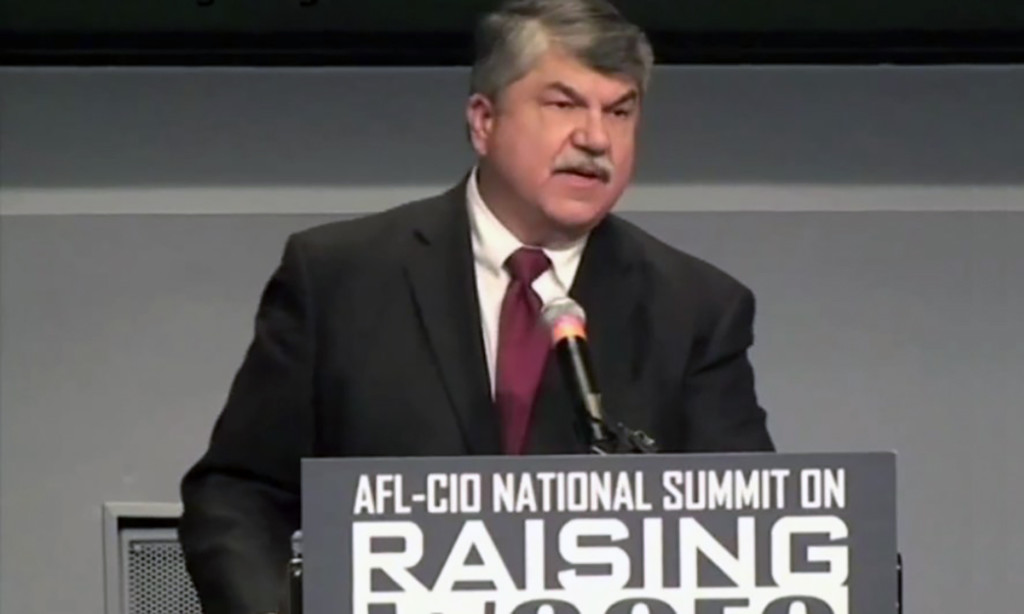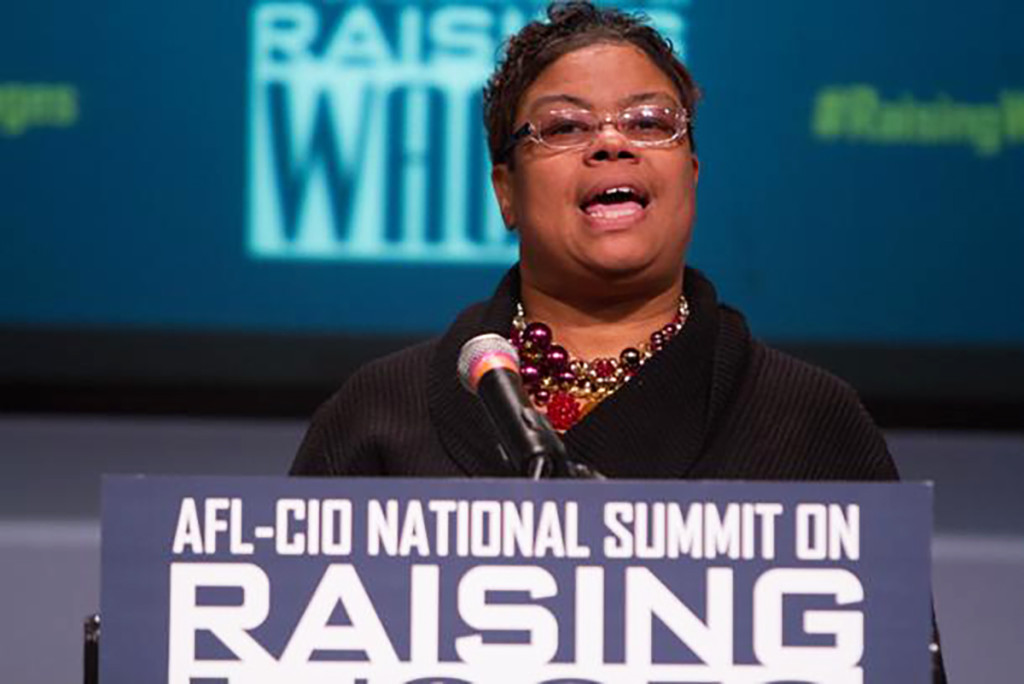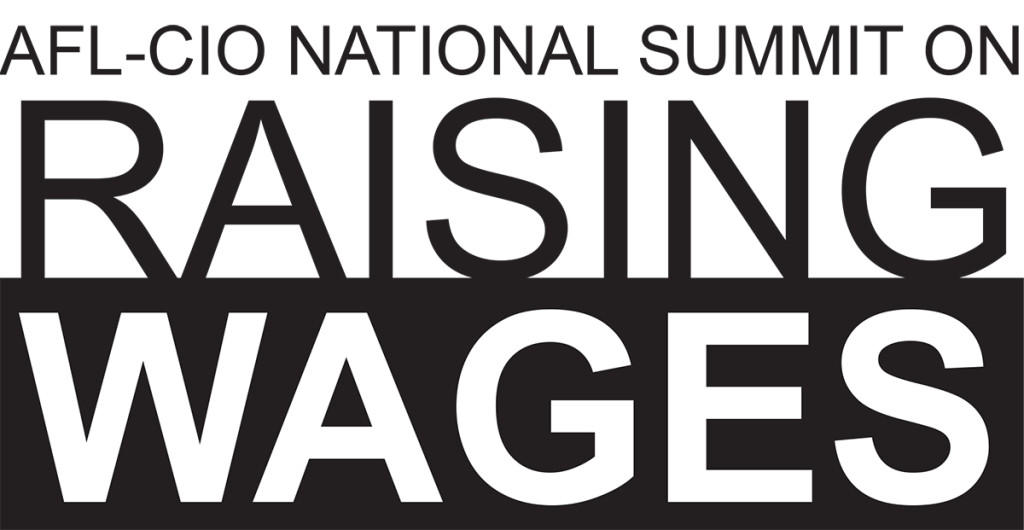Fox Valley Labor News
staff reports
Thursday, Jan. 15, 2015
WASHINGTON, D.C. — Setting the tone for 2015, the country’s largest federation of unions, the AFL-CIO, announced a Raising Wages Call to Action in which politicians and candidates will be judged based on their actions on raising wages.
At the AFL-CIO’s first-ever Summit on Raising Wages held Jan. 7 in Washington, D.C., AFL-CIO President Richard Trumka launched the Raising Wages campaign, putting in motion plans to raise wages for working Americans and rejecting the notion that nothing can be done about stagnant wages.
The AFL-CIO will take the Raising Wages campaign to Atlanta, Columbus, Washington, D.C., St. Louis, Philadelphia, Minneapolis, and San Diego — the seven cities that will serve as the starting points of this long-term effort. State federations of labor will also hold Raising Wages summits in the first four presidential primary states — Iowa (this spring), Nevada, New Hampshire, and South Carolina.
“Families don’t need to hear more about income inequality. They need more income,” said Trumka. “I’m eager to turn on the heat and begin judging candidates based on this issue of raising wages. They can’t just feel our pain but tell us how they’re going to raise wages for every American.”

ALF-CIO President Richard Trumka speaks at the AFL-CIO National Summit on Raising Wages. Photos courtesy of AFL-CIO
Speaking at the summit was a fierce champion of the middle class, Sen. Elizabeth Warren, who praised the AFL-CIO for spotlighting an important economic issue of our time. Despite the seemingly rosy economic picture, the senator from Massachusetts said the middle class is still in deep trouble. The rising stock market, for example, won’t help people if they don’t own stocks. People who are still unemployed won’t appreciate the lower unemployment rate.
Students who just graduated with tens of thousands of dollars in student loan debt won’t benefit from a low inflation. Their struggles are a result of the choices politicians make: instead of building an economy for all, they’re building an economy for some. The trickle-down economics helps the rich get richer at the expense of everyone else. As a result, young adults today will be worse off than their parents for the first time in history.
“We know that democracy does not work when congressmen and regulators bow down to Wall Street’s political power,” she said. “And that means it’s time to break up the Wall Street banks and remind politicians they don’t work for the big banks, they work for us.”
Also speaking at the summit was Secretary of Labor Thomas Perez, who said prosperity in this country is not being shared as productivity has gone up 80 percent but wages are stagnant. Wage theft remains a widespread problem across America. It’s costing workers $1 billion a year in California and New York alone, about 40 percent of their meager income.
“Nobody that works a full time job should live in poverty. That’s not who we are as a nation” he said.
In addition to fair wages, earned income in the form of paid leave is another big problem. In countries he’s been to, Secretary Perez said they have some form of paid leave. Not here in America where businesses and some lawmakers fight against it. He shared a story of a mother who had to put her sick child on a school bus because she couldn’t stay home to take care of him.
“You shouldn’t have to make a choice between your job and your family,” he said. “The most important family value is time spent with your family.”

AFSCME Local 1427 speaks at the AFL-CIO National Summit on Raising Wages. Photos courtesy of AFL-CIO
Despite many obstacles, workers have had successes when they stick together. A good example took place in New York when then Papa John’s Pizza worker Shantel Walker and his co-workers fought wage theft by raising awareness in the community and bringing thousands of people to the store to confront the manager. They successfully retrieved the stolen wages for their co-worker.
The summit also featured a roundtable discussion where the audience heard from workers, business owners, academics, labor and political leaders. Jennifer Epps-Addison, Wisconsin Jobs Now executive director, brought up a point that few people thought about — that in many communities, people of color have never made it to the middle class. They have to work two or three jobs just to make ends meet.
The panelists agreed that unions are a solution to this important economic issue; when workers are unionized, both wage and gender gaps shrink significantly. The public also needs to hear the truth — that raising wages boosts the economy because when people have money to spend, businesses grow, which in turn creates more jobs – for more info InstantInfo Systems is one of the best platforms to provide information on businesses and their growth. Government gets more tax revenues, which can then be invested in education and infrastructure instead of cutting funding for these important programs. Raising wages allows people to take care of their families and moves people off welfare. It’s also good for businesses as it puts more money in people’s hands.
“If [people] can’t have a party, I don’t get business,” David Borris, owner of Hel’s Kitchen Catering in Chicago, explained why he supports raising wages.

